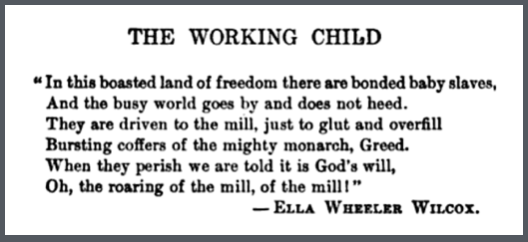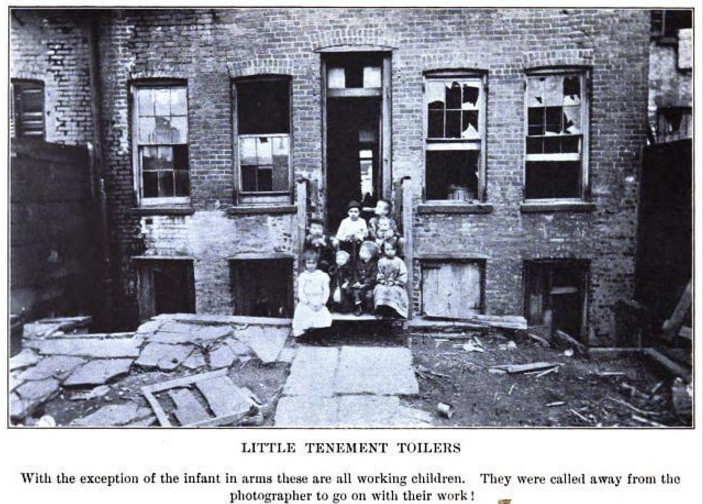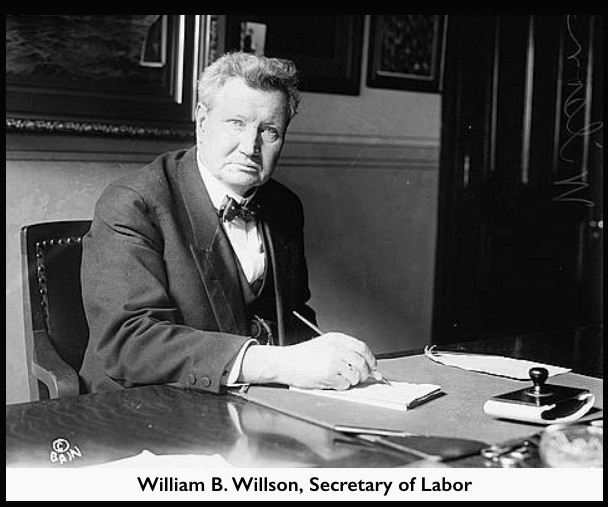
Hellraisers Journal, Tuesday October 23, 1917
Washington, D. C. – Report on Poverty from U. S. Department of Labor

—–
The nation was shocked in 1906 when John Spargo’s Bitter Cry of the Children revealed shocking details of the lives of millions of American children who then lived in conditions of abject poverty (such as those pictured above). A recent report from the Labor Department’s Bureau of Labor Statistics, demonstrates that conditions of “economic indecency” are yet commonplace among the American working class.
From the Appeal to Reason of October 20, 1917:
Bad Living Conditions In the
Nation’s CapitalEverybody knows-and mostly from painful personal experience-that living conditions are shockingly miserable as a result of high prices. But when confronted with the cold facts and figures, such as the Appeal has been running regularly for several weeks past, one realizes the truth even more terribly. We do not believe any one can read the following report of the federal bureau of labor statistics on living conditions in the city of Washington, which appears in the Weekly News Letter of the American Federation of Labor, without agreeing that it affords “a shocking example of economic indecency”:
The bureau of labor statistics, federal department of labor, brands living conditions of many Washington families as a “shocking example of economic indecency.”
The bureau has concluded an investigation of the cost of living in this city and finds that nearly one-third of the families of workers, both white and colored, finished the year 1916 in debt.
Schedules were obtained from 1,481 white families and from 629 colored families, making a total of 2,110 families.
“The number of families scheduled was large enough to permit trustworthy averages and deductions,” says the report. “Only in the lowest and highest income groups are the numbers so small as to make generalizations doubtful.”
“It is startling to learn,” says the report, “that in the capital of the nation, in a year of unprecedented high prices, 807, or 38 per cent of 2,110 families taken at random had yearly incomes of less than $900, and 1,295 families, or 61 per cent had incomes of less than $1,200 a year. As noted above, some of these families were of small size, but the averages were not abnormally low. Thus, for families receiving less than $900 per year the family household averaged 4.4 members and the net family averaged 3.4 members; for families receiving less than $1,200 the corresponding averages were 4.6 and 3.5.”
The summary showing that nearly one-third of the families investigated finished 1916 with deficits “reveals a shocking state of economic indecency,” it is stated.
“The negroes fared worse than the whites,” continued the report. “Out of 620 negro families 180, or nearly 29 per cent, were obliged to try to keep body and soul together on less than $600 a year, and 472, or no less than three-quarters of the total, lived on less than $900. Among the white families conditions were better, but not vastly so. Out of 1,481 such families there were 65 who had less than $600 to keep them through the year, while no less than 335, or nearly 23 per cent existed on less than $900, and 710 or almost one-half, had less than $1,200 a year.”
Only those families were scheduled whose principal breadwinner worked for wages and earned not more than $1800 a year unless engaged in some mechanical trade like that of railroad engineer.
To get the incomes and expenditures of families special agents were sent out to interview housewives in their homes. To insure a fair representation of the working population of Washington, including government clerks, the city was divided into districts and a fair proportion of schedules were obtained from each district.
———-
Response of Secretary of Labor, William B. Wilson(?)

—–
Yours truly could find no comment from Secretary of Labor William B. Wilson on the state of “economic indecency” existing in the nation’s capital whereby those who upbuild the Nation are, themselves, degraded by the daily grind of poverty. However, we did come across this warning regarding “profiteering” from the former Secretary of the United Mine Workers of America wherein he cautioned both-sides of the class divided (both the millionaires and the impoverished working-class) to rein in their economic exceptions and “to make sacrifices in order to keep our industries running smoothly” during wartime-the workers being asked to sacrifice the food on their dinner tables, while the millionaires are asked to sacrifice a few luxuries. That hardly seems like an equitable sacrifice, but, nevertheless we will let the kept press present the prevailing view of patriotic economic sacrifice:
From Ohio’s East Liverpool Evening Review of October 6, 1917:
TWO KINDS OF PROFITEERING.
In his address before the war convention of American business men at Atlantic City recently, Secretary of Labor William B. Wilson made a pertinent point when he declared that labor, as well as capital, must refrain from “profiteering.” In other words, that it is as much the duty of employes as of employers to keep from coining excessive profits out of conditions arising from the war, especially through the application of extortionate methods. A special form of patriotism is demanded from capital and wealth at this time, involving the exercise of self-denial and even sacrifice not expected under normal conditions. Pending legislation is designed to render this war-time burden equitable, but even in the absence of laws on the subject “big business” in America has responded most nobly and generally to the country’s call. “Employers and employes should both be willing to yield something for industrial peace, should both be willing to make sacrifices in order to keep our industries running smoothly.” To seek to take advantage of the nation’s emergency to gain concessions unobtainable in normal times is bordering closely on disloyalty, especially when such action delays work on materials absolutely necessary to the government for the conduct of the war…..
SOURCES
Appeal to Reason
(Girard, Kansas)
-Oct 20, 1917
https://www.newspapers.com/image/67312917/
The Evening Review
(East Liverpool, Ohio)
-October 6, 1917
https://www.newspapers.com/image/58088808/
IMAGES
Bitter Cry, Spargo, Little Tenement Toilers, Feb 1906
https://play.google.com/books/reader?id=5qSXMJQG6E4C&printsec=frontcover&output=reader&hl=en&pg=GBS.PA140-IA1
William B Wilson, Sec of Labor, LOC ab 1913
http://www.loc.gov/pictures/item/ggb2005011539/
See also:
Monthly Review of the U. S. Bureau of
Labor Statistics, Volume V
-July to Dec 1917
U. S. Department of Labor, Washington, DC
https://books.google.com/books?id=4PwWAQAAIAAJ
Monthly Review – October 1917
“Cost of Living in the district of Columbia”
https://play.google.com/books/reader?id=4PwWAQAAIAAJ&printsec=frontcover&output=reader&hl=en&pg=GBS.RA1-PA1
William Bauchop Wilson
https://en.wikipedia.org/wiki/William_Bauchop_Wilson
